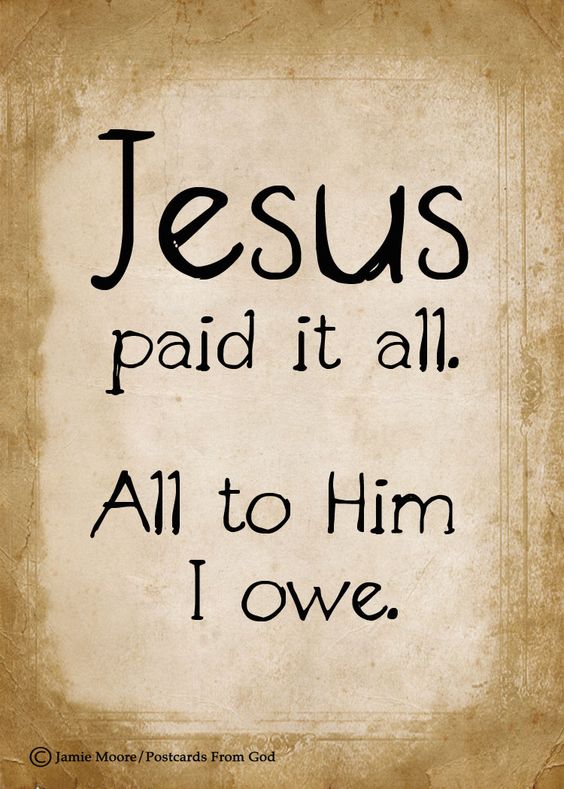In searching for the background of the writing of this great hymn I came upon two different stories and I'm not sure which one is the accurate one. The first one says that the great missionary Dr. Oswald Smith (1890-1979) spent 1915-1917 as a missionary to the West Coast Canadian Indians. He traveled to the villages by packboat. Oswald's faith was simple - knowing Jesus personally. Secondly, he knew Jesus brought deliverance and divine healing. He saw the despair, the disease, the alcoholism that was destroying the native people. He was particularly shaken by the anguish and lack of hope at a traditional Native funeral for a young child. The image haunted him, and he wrote a hymn depicting the change that took place in the lives of men when Jesus came. The second story tells of Evangelist Dr. Harry Rimmer preaching on John 11. He pictured the sorrow that darkened the home, and the sadness of Mary and Martha, when their brother Lazarus died. Suddenly, he paused, and shouted triumphantly, "Then Jesus came!" Sitting in the audience that evening was gospel musician Homer Rodeheaver. The phrase struck him as a great theme for a song. Shortly after, he was visiting with pastor and hymn writer Oswald Smith. It was May of 1939. The musician said, "I want a hymn depicting the change that took place in the lives of men and women when Jesus came. Dr. Smith provided the text, and Rodeheaver set it to music. Now I have no idea which story is the correct one, but I assume that part of the hymn is based on the story of blind Bartimaeus who was miraculously healed by Jesus as He passed by the blind man. But it also shares other incidents where lives where changed when Jesus came. And even today more verses could be written as lives continue to be changed when Jesus comes. He takes away the gloom, breaks the tempter's power and He fills the life with glory. And He comes to stay. Hopefully you, too, have experienced this transformation when Jesus came your way. Thank Him for the transformation in your life as you reflect upon these words this week.
(1) One sat alone beside the highway begging,
His eyes were blind, the light he could not see.
He clutched his rags and shivered in the shadows
Then Jesus came and bade his darkness flee.
When Jesus comes, the tempter's power is broken;
When Jesus comes, the tears are wiped away,
He takes the gloom and fills the life with glory,
For all is changed when Jesus comes to stay.
(2) From home and friends the evil spirits drove him,
Among the tombs he dwelt in misery;
He cut himself as demon powers possessed him,
Then Jesus came and set the captive free.
When Jesus comes, the tempter's power is broken;
When Jesus comes, the tears are wiped away,
He takes the gloom and fills the life with glory,
For all is changed when Jesus comes to stay.
(3) "Unclean, unclean!" the leper cried in torment,
The deaf, the dumb, in helplessness stood near;
The fever raged, disease had gripped its' victim,
Then Jesus came and cast out every fear.
When Jesus comes, the tempter's power is broken;
When Jesus comes, the tears are wiped away,
He takes the gloom and fills the life with glory,
For all is changed when Jesus comes to stay.
(4) Their hearts were sad as in the tomb they laid him,
For death had come and taken him away;
Their night was dark and bitter tears were falling,
Then Jesus came and night was turned to day.
When Jesus comes, the tempter's power is broken;
When Jesus comes, the tears are wiped away,
He takes the gloom and fills the life with glory,
For all is changed when Jesus comes to stay.
(5) So men today have found the Savior able,
They could not conquer passion, lust and sin;
Their broken hearts had left them sad and lonely,
Then Jesus came and dwelt, Himself, within.
When Jesus comes, the tempter's power is broken;
When Jesus comes, the tears are wiped away,
He takes the gloom and fills the life with glory,
For all is changed when Jesus comes to stay.
Listen to it being sung by George Beverly Shea who used this song so often in Billy Graham Crusades. LISTEN

















